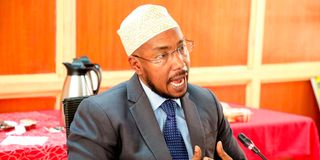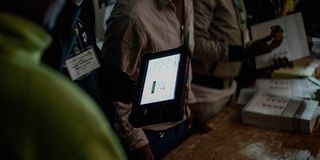Premium
How Sh600m telcos' debt threatened IEBC’s election results transmission

IEBC chief executive Marjan Hussein Marjan when he appeared before the National Assembly Committee on Diaspora Affairs and Migrant Workers on March 14, 2023.
A Sh600 million standoff between the government and telecommunication companies nearly disrupted the presidential election results transmission and plunged the country into a constitutional crisis last year, MPs heard yesterday.
The firms threatened to switch off the results transmission system as they demanded payment.
Four local mobile network operators (MNOs)—Safaricom, Airtel, Telkom and Osta Tech/Safa-IEC Telecom (Thuraya)—contemplated resorting to the drastic action over the failure by the Independent Electoral and Boundaries Commission (IEBC) to pay them Sh601.03 million.
A report presented to the National Assembly Public Accounts Committee (PAC) by IEBC Chief Executive Officer Marjan Hussein Marjan shows that despite the threats by the MNOs, the National Treasury failed to release the money, forcing the commission to reallocate its budget to “forestall” a crisis.
The document captures correspondences from Mr Marjan and former chairman Wafula Chebukati begging Treasury to clear the MNOs’ pending bills.

A staff member of the Independent Electoral and Boundaries Commission (IEBC) inspects a Kenya Integrated Election Management System (KIEMS) kit in a bag in Kisumu on August 8, 2022, ahead of Kenya's General Election.
“The MNOs have threatened to disconnect our data centre, which is key infrastructure for result transmission in the upcoming general elections. Failure to settle the long outstanding amounts will lead to service disruption, which may compromise the network resilience resulting in lack of credibility of the elections and non-compliance with the law and established regulations,” Mr Marjan’s letter of July 22, 2022, to then-Treasury Cabinet Secretary Ukur Yatani reads.
“The purpose of this letter is to urgently request for allocation of additional funds and approve the reallocation to settle the pending bills and contractual obligations of MNOs. It is important to note that the commission has limited timelines and disconnection notices,” Mr Marjan added.
By the time Mr Marjan was writing the letter, it was 17 days to the General Election.
No Treasury response
However, Mr Marjan told the committee that Mr Yattani never responded to the letter, forcing the commission to reallocate its budget to cater for the interests of the MNOs to forestall any possibility of the election results transmission data centre being disconnected.

An Independent Electoral and Boundaries Commission (IEBC) official verifies a voter's details on the Kenya Integrated Electoral Management System (KIEMS) kit during Kenya's general election in Kisumu on August 9, 2022.
“We have a schedule of correspondences to the National Treasury requesting money to pay our suppliers. It is an indication that we have been engaging them but they have never responded,” said Mr Marjan.
Section 39 (1) (c) of the Elections Act of 2011 requires the IEBC to electronically transmit presidential election results from polling stations to the Constituency Tallying Centre and to the National Tallying Centre in Nairobi.
The IEBC document further shows that towards the end of the 2021/22 financial year, the commission engaged the four MNOs for the provision of the Kenya Integrated Election Management System (Kiems) results transmission network. But the commission was in a quandary after it realised that what the MNOs quoted exceeded the Sh338.53 million used for the 2017 presidential election, which is what had been used to budget.
The MNOs quoted Sh939.56 for which contracts were signed, leaving a deficit of Sh601.03 million. Safaricom signed a contract amount of Sh370.1 million, Telkom Sh191.97 million, Airtel Sh175.59 million and Osta Tech Sh201.95 million.
The ICT general election work plan deficit for the election would reduce to Sh830.13 million after the commission settled some funds owed.
The commission later reviewed its budget as it sought to reallocate Sh350 million from the general election materials budget and requested Sh480.13 million in additional funding to bridge the deficit for Kiems result transmission instead of the Sh601.03 million.
An October 12, 2020 letter by Mr Chebukati seeking the intervention of former Solicitor-General Ken Ogeto indicated that Sh1.3 billion was allocated to the commission for 2018/19 and 2020/21 to settle pending legal fees. However, no allocation was made to cater for the other categories of pending bills, especially the mobile network and ICT service providers.
“Some of these service providers have already sued the commission claiming not only the principal amount but also interest, penalties and costs of suits. This will further compound the problem of pending bills. The commission, therefore, seeks your intervention in securing funding to settle the bills,” Mr Chebukati wrote.


